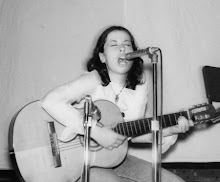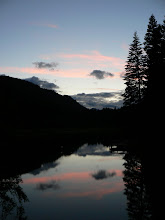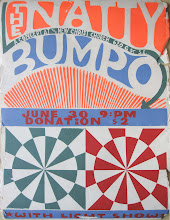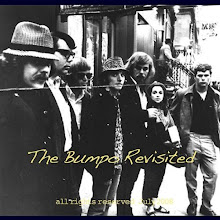I first learned to walk at the age of nine months, when according to my mother, I fell in the kitchen of the little house my father was still building and hit my head on a nail sticking out of an interior wall. I didn't try again for months.
The scar is still there above my right eye, right at the spot where I eventually began plucking my eyebrows. You can hardly see it any more, because I plucked my eyebrows long enough that they will never grown back.
During this same time period, I learned the hard way about "No." I was repeatedly told by my mother not to touch the hot woodstove, and then I did. I seared my little hand quite badly, I am told.
I was also reported by the neighbor across the road in Buena Heights as an incorrigible stripper. I loved to run about in the front yard naked around age two because it felt so good, taking off all my clothes as soon as I was left alone to play.
There was a neighbor boy, and I remember sitting in the yard making mud pies with him ---- and eating them. He was the kid who sent the whole neighborhood on a treasure hunt, looking for the other shoe from a brand new pair that he had taken off and abandoned somewhere.
We moved to Boise, Idaho, where my parents worked for a children's home, then as house parents at a juvenile delinquent home run by the same church and Bible school that my father attended.
I remember my sister and I sitting on a blanket in the side yard at the children's home in Boise, as my 18-month-old brother became fascinated by a spider crawling on the wall. It was a black widow and we told him not to touch it, but he did. He was bitten and was in a coma. He came to in the hospital, singing "Jesus Loves Me" to the nurses from his crib. He still sings, and is now a hospice chaplain in Louisiana.
From age three or so, I was raised as just another one of the orphans or other abandoned children, at least during meal times and during group activities. I remember being under the supervision of a woman other than my mother, who tried to hurry me in the bathroom right before church service. I would not be hurried, and so produced a tiny pellet in my underpants during the service, to my utter humiliation. While my mother was in the hospital having another sister, I was placed in the charge of one of the 'big kids,' an 18-year-old boy who put me on the back of his bicycle to ride double. I got my foot caught in the spokes, and spent the next six weeks unable to walk. My mother had a new baby but also had to carry me to the bathroom. The doctors thought I might never walk right again. At age 60, that same ankle, which I have broken two more times at the same weak spot, is giving me problems and I may be reduced to using a cane soon.
In Iowa, we lived in a single-wide trailer, first in an Ottumwa trailer park with the gypsies, who stole things from us, then at the edge of the woods next to a cornfield on the property of friends. My father was attending the Midwestern School of Evangelism, learning Greek and Hebrew fulltime while also working as a grocery bagboy, then as a mechanic, with four, then five kids to support. My mother was an RN and worked at the hospital, leaving us youngsters in the care of Sadie Hooten. She was a widow whose husband had been a miner, less than exemplary while he was still alive. She played with us using shoeboxes and Sear's catalogues to make homemade doll houses. She also made us sugar cookies with caraway seeds, the inspiration for my failed attempt at age 10 or 11 to make a chocolate cake with caraway seeds in it.
While in Iowa, Mom tried to learn to drive a stick. She took us to school at the one-room schoolhouse at Dahlonega in the pickup, and also came to pick us up to go home. as there was no schoolbus. We rattled around in the back of the pickup bed as it lurched wildly while she attempted to change gears on the Iowa backroads.
Our trailer next to the woods was also near the crazy house or "poor farm," where people were sent when their families couldn't care for them any longer, or they had no one left to care. I'm sure some of them had Alzheimer's. One old man was fairly harmless and wandered away repeatedly. He was always found in the cornfield near us, feeding corn off the stalks to his pet groundhogs.
Our dog Duke, one of a loyal succession of black cocker spaniels, had the end of his tongue bitten off by a groundhog. He also successfully chased off ---- and drew quantities of blood from --- the burglar who broke into the shed next to the trailer containing my father's tools.
We moved back to the Northwest one semester shy of my father's graduation from the seminary when my brother was born with breathing difficulties stemming from the Iowa weather and an enlarged thymus gland. As we went over the Continental Divide, his labored breath grew easier.
We lived in the trailer at the bottom of my grandparents' driveway at first, then moved into a stucco, flat-roofed house in Yakima on 11th Avenue. For my tenth birthday, my father bought an old Schwinn bike, completely taking it apart and painting it red. I rode that bike everywhere. I especially liked to ride out to the Yakima Airport and watch the planes take off, a ten-mile round trip. Would parents these days allow a child to do that? I don't think so.
We traded the house in town for my grandparents' place in the country. It was a former chicken ranch, with long outbuildings and a giant barn. We used one of the chicken houses as a playhouse, with old car seats for couches, dishes and books. I was hiding from chores one day, sitting in a milking stanchion in the barn reading a book, when a rattlesnake slithered up the wall right next to me. I jumped up and ran straight up the long flight of stone steps from the barn to the house, collapsing on the front porch while muttering, "snake, snake."
One day, also probably trying to avoid chores, I became angry at my mother over something and rode the red bike straight down that steep hill between the row of poplars, gathering speed as I went. At the 90-degree turn at the bottom of the hill, I lost control and wiped out.
The tire guard sliced my left knee to the bone, and I staggered up the hill to the house, bone showing and blood streaming. My mother, the RN, nearly fainted as I appeared at the house singing "Who's Afraid of the Big Bad Wolf," (don't ask me why). They couldn't take me to the hospital right away because my father was in the middle of burning off half the pasture, and she still couldn't drive a stick properly.
When they finally got me to the doctor in Yakima. I was still in shock, and he sewed me up in without any sort of anesthetic. He had been a missionary in China, and was an intrepid mountaineer who had been best pals with then-Justice William O. Douglas, who at the time had just taken up with a waitress thirty years younger.
In high school, one of my first boyfriends was an Eagle Scout who worked summers for Douglas, cutting firewood and hanging out at his cabin near Bumping Lake.
My grandparents ran a boat landing and concession at Bumping Lake for several years, when Grandma wasn't cooking for the Forest Service firefighters and they weren't being the caretakers at the nearby Girl Scout camp.
We loved to stay with Grandma and Grandpa for a week or so during the summer, one at a time so as to get us out of Mom's hair while she was working the night shift at the hospital. The boat landing position included free rent on a cabin built on stilts out over the water.
We paddled around the lake half the day in one of the rowboats that wasn't rented out, fishing, swimming and messing around. It was paradise. Grandma caught trout for breakfast off the deck, and made us biscuits in the woodstove.
We went back to to Bumping Lake to visit two summers ago during a family reunion at a nearby campground. While the cabin on stilts wasn't there, the dock was, and the lake was as beautiful as I remembered it.
We survived all kinds of things when we were young. Dad made a third seat for the Carry-All, and we had to wear one of the first seatbelts (there were nine of us by then). He made that thing from webbing, just like he made the 14-foot camping trailer that slept nine from the axle up, with its ingenious folding double canvas bunks at each end. The seatbelt was one belt stretching across the laps of three people, but we were belted in.
When the people didn't immediately move out of the house Dad bought in Wapato, we lived in that trailer at least a couple of months. We must have been their worst nightmare. We moved in next to the garage, living in the camping trailer because we'd already sold our other house. All nine of us were jammed into that trailer, the youngest sleeping in a trundle bed that later became a toy box. We used the outhouse on the other side of the garage, and had to get out of the trailer while Mom was cooking, because there wasn't enough room for us to be in there while she was at work, even if it was raining. I don't remember how we managed showers. I was in junior high by that time.
I remember vividly the day that JFK was killed. Most kids were crying, but the budding John Birchers were cheering.
I later had a 4-H project, a purebred Jersey cow, and got up early every morning to train her to lead on a halter up and down the driveway preparing to show her at the fair. One of the neighbor boys would "moo" at me in the hallway at school. Looking back, I think it may also have had something to do with my 36-inch bustline, which suddenly sprouted when I was 13.
A 19-year-old guy came to stay with my family while trying to help them start a church, and took quite a shine to me. My parents decided it wasn't such a great idea having him live there in the house. Later that year, he married an older divorcee with several young girls. I was devastated.
I wrote poetry and dreamed my way through the rest of high school, picking up a guitar and becoming a folkie by my senior year, which was spent in Arizona,. I left the same seminary in Iowa my Dad attended after the first semester, due to an existential crisis, and ran away to California and the Haight-Ashbury the summer after the Summer of Love.
I then hitchhiked across the U.S. by myself, leaving San Francisco the day after Martin Luther King was killed.
Thinking back on all that now, it's amazing that I am still here, walking around (barely).




















